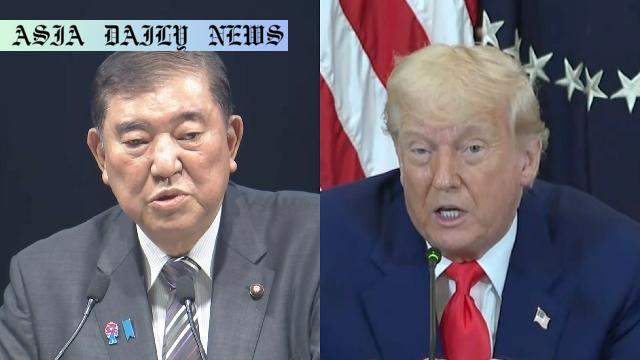Tariff talks: Japanese Prime Minister Ishiba expressed optimism for productive tariff negotiations during a call with President Trump.

Japan and the United States Set Stage for Crucial Tariff Talks
In a significant 45-minute phone call, Japanese Prime Minister Ishiba Shigeru and US President Donald Trump paved the way for the upcoming tariff talks between the two economic powerhouses. The discussion, initiated at the request of the US side, centered around strengthening bilateral trade relations through productive negotiations that could potentially reshape tariff structures. Prime Minister Ishiba emphasized Japan’s hope for a review of the existing tariff regime while reiterating his country’s commitment to fostering a mutually beneficial economic relationship with the United States.
The mutual agreement on the importance of productive talks comes at a crucial time, as both nations grapple with challenges in international trade. Ishiba stressed that investment, rather than punitive tariffs, holds the key to sustainable economic growth. His comments underscore Japan’s approach to nurturing economic collaboration and creating job opportunities that benefit both partners.
G7 Summit: A Platform for Further Collaboration
Prime Minister Ishiba conveyed his anticipation of meeting President Trump in person during the G7 Summit, set to take place in Canada in mid-June. This high-profile event could offer both leaders an opportunity to delve deeper into tariff-related issues and other critical matters, including national and global security. The discussions, he hopes, will underscore Japan’s unwavering stance on cooperative investment ventures and tariffs.
During their conversation, Trump also briefed Ishiba on his recent diplomatic initiatives in the Middle East. The Prime Minister expressed gratitude for the US’s regional engagements, further highlighting the strategic alliance between the two nations. Both leaders shared their aspirations for building stronger, mutually beneficial economic relations and fostering global stability.
Collaborative Investments as a Strategic Focus
The talks highlighted Japan’s consistent emphasis on investments rather than protectionism as the foundation for economic partnership. Ishiba reiterated that Japan will continue cooperating with the United States to enhance investment flows and job creation. By focusing on shared objectives, such as economic growth and innovation, both countries aim to build a foundation of long-term trade and investment cooperation.
Ishiba also hinted at the possibility of additional in-person discussions with Trump in the near future, outside of the structured G7 framework. This aligns with Japan’s commitment to maintaining close ties and leveraging every available opportunity to bolster economic bonds. The importance placed on direct diplomatic engagement reinforces the gravity of these conversations.
Conclusion: A Milestone for US-Japan Relations
As the tariff discussions approach, Japan and the United States stand at a pivotal juncture in their economic relationship. The phone call between Ishiba and Trump underscores shared values and objectives, positioning both nations for a constructive dialogue at the ministerial level. Through proactive initiatives and steadfast diplomacy, Japan seeks to navigate past protectionism and toward a future of shared prosperity with the United States.
The mutual willingness to address issues head-on sets a promising tone for upcoming talks, reinforcing the importance of trust, cooperation, and visionary leadership.
Commentary
Ensuring Mutually Beneficial Tariff Discussions
The conversation between Japanese Prime Minister Ishiba Shigeru and US President Donald Trump marks an important step in fostering constructive tariff talks that hold significant implications for global trade. Ishiba’s emphasis on investment over protectionist tariff measures reflects a progressive approach aimed at building sustainable economic ties between Japan and the United States.
Japan’s strategy to prioritize shared economic growth aligns with a broader vision of fostering global partnerships amid rising protectionism across the world. By stressing the importance of creating jobs and nurturing investments, Ishiba highlights a practical alternative to trade disputes that often harm economies on both sides. This pragmatic attitude resonated in Trump’s agreement to pursue productive negotiations, setting an optimistic tone for future collaborations.
G7 Summit: A Crucial Opportunity for Dialogue
The upcoming G7 Summit presents a prime opportunity for deeper engagement on trade and broader international issues. Both leaders recognize the value of this platform to reinforce diplomatic efforts and address pressing trade concerns. Ishiba’s willingness to explore avenues for additional discussions with Trump underscores Japan’s commitment to nurturing strategic alliances with key global players.
Prime Minister Ishiba’s diplomatic tact and forward-thinking policies are vital in maintaining a balance between Japan’s trade interests and its role as an ally to the United States. Similarly, the G7 may serve as a critical diplomatic space for hashing out contentious issues in a more collaborative setting.
A Shared Path Toward Economic Stability
What sets these tariff talks apart is the mutual buy-in from both nations, with Japan underscoring the importance of investment while avoiding retaliatory measures. This positions the Japan-US partnership as a potential model for economic diplomacy in a time of uncertainty, opening the door for innovative approaches to bilateral cooperation.
As these efforts unfold, it is clear that Japan’s commitment to building a mutually beneficial relationship with the US stands firm. This is the kind of leadership that is essential to navigating the complex dynamics of global trade, ensuring a future rooted in collaboration, innovation, and shared prosperity.


